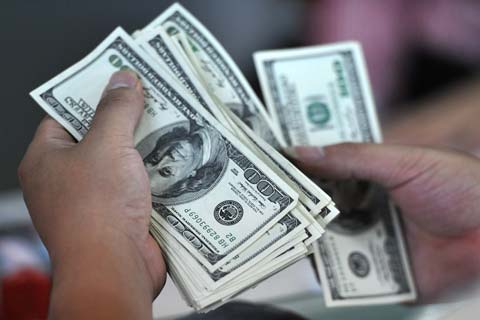Dollar appreciation attributed to a new rising demand power
 |
Dollar price shoots up
All commercial banks quoted the dollar price at the ceiling level of 21,036 dong per dollar by the afternoon of June 6. The foreign currency trading band now is one percent, which means that the dollar price quoted by commercial banks must not be more than one percent higher than the dollar price announced by the State Bank of Vietnam.
This is the sharpest dollar price increase so far this year, with which the dollar has regained the peak set in late 2011.
Over the last five days, the dollar price has increased by 150-170 dong per dollar from the 20,870 dong per dollar level which had been stabilized for the last many days. Especially, the 3-month sharpest price increase still takes place, even though the interbank exchange rate stays at 20,828 dong per dollar.
While the unexpected dollar price increases have raised worries among people, bankers say this is not a surprise at all. In principle, the demand for dollar usually increases in June, when enterprises import essential goods, while petroleum importers have to make periodic payment. Once the demand increases, the dollar price would increase accordingly.
Meanwhile, the Vietnam dong interest rates tend to decrease, thus making the dollar more attractive. The speculation may lead to the overvaluation of the dollar.
With the argument, analysts believe that the dollar price increases would last only for a short time.
However, the explanation has not satisfied people and investors. The State Bank of Vietnam has affirmed the profuse foreign currency reserves, while the payment balance remains in stability.
HSBC, in its latest report, also said that the Vietnam’s foreign currency reserves have increased by 30 percent over the end of 2011, thus helping raise Vietnam’s capability to deal with the negative happenings.
Why does the dollar still increase, then?
Some investors have made a guess that there is a tendency of banks converting their dong capital into dollar capital to optimise their profits in the context of the stagnant dong lending.
Despite the dong interest rate decreases, banks still cannot push up lending in the context of the stagnant production. The banks with profuse capital do not want to lend on the interbank market, where the interest rates have fallen to 3-4 per cent. In such circumstances, converting dong into dollar capital proves to be a good choice.
Meanwhile, some other investors think about the possibility of foreign investors withdrawing money from Vietnam. Foreign securities investors have been selling their shares in big quantities on both the Hanoi and Ho Chi Minh City bourses.
Besides, the dollar interest rate downward in Vietnam may also lead to the outflow of the dollar from Vietnam. In the past, Vietnam attracted dollar capital from the world because it offered high deposit interest rates.
There is one more reasonable explanation for the dollar appreciation that the unsatisfactory exports in the first months of the year in the context of the global economic crisis have led to the short supply of dollars.
In fact, if comparing with the beginning of 2012, the current dollar price is not higher. It has just regained the 21,036 dong per dollar peak. Meanwhile, if considering the price performance in the last days, the dollar price has increased by 0.8 per cent.
What the stars mean:
★ Poor ★ ★ Promising ★★★ Good ★★★★ Very good ★★★★★ Exceptional
Related Contents
Latest News
More News
- Cashless payments hit 28 times GDP in 2025 (February 04, 2026 | 18:09)
- SSIAM and DBJ launch Japan Vietnam Capital Fund (February 04, 2026 | 15:57)
- Banks target stronger profits, credit growth in 2026 (February 04, 2026 | 15:43)
- Vietnam on path to investment-grade rating (February 03, 2026 | 13:07)
- Consumer finance sector posts sharp profit growth (February 03, 2026 | 13:05)
- Insurance market building the next chapter of protection (February 02, 2026 | 11:16)
- NAB Innovation Centre underscores Vietnam’s appeal for tech investment (January 30, 2026 | 11:16)
- Vietnam strengthens public debt management with World Bank and IMF (January 30, 2026 | 11:00)
- Corporate bond market poised for stronger growth cycle (January 28, 2026 | 17:13)
- Vietnam's IPO market on recovery trajectory (January 28, 2026 | 17:04)

 Tag:
Tag:


















 Mobile Version
Mobile Version